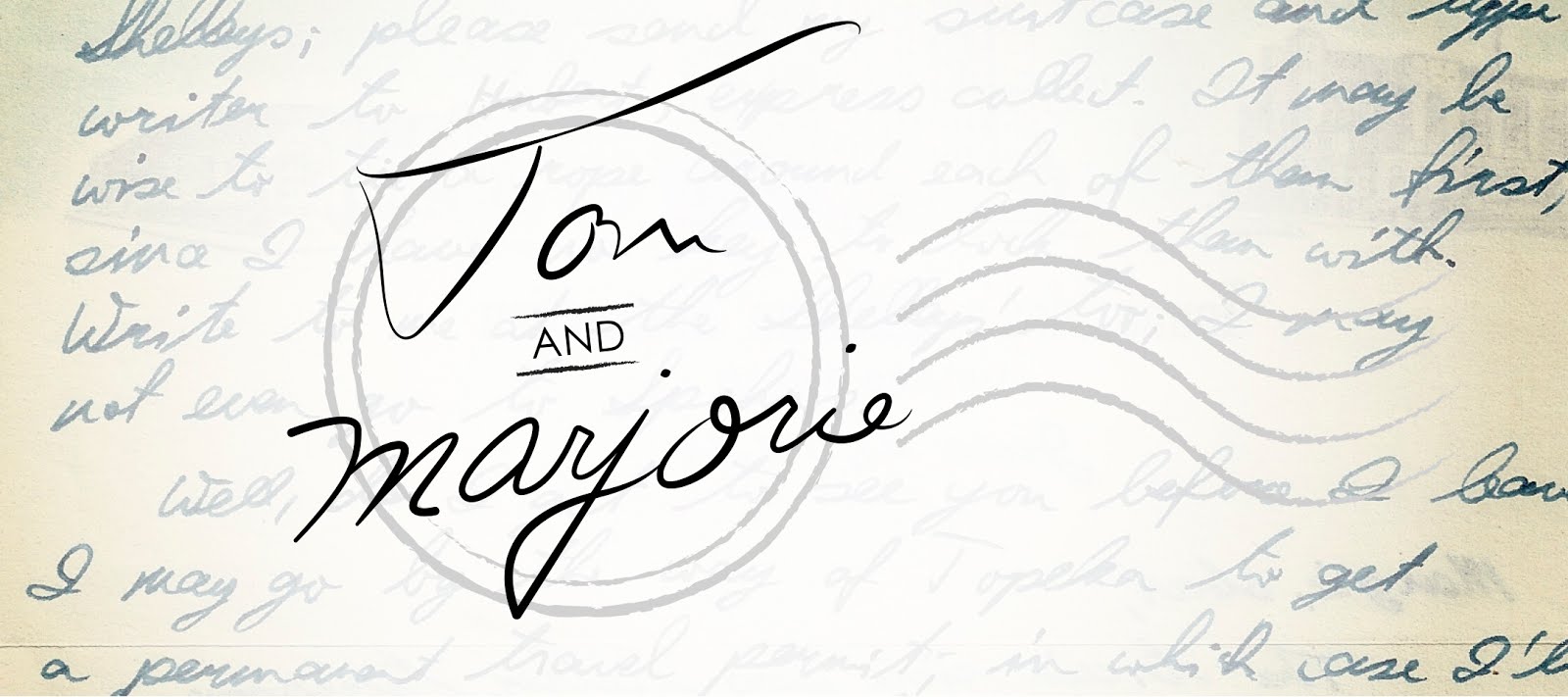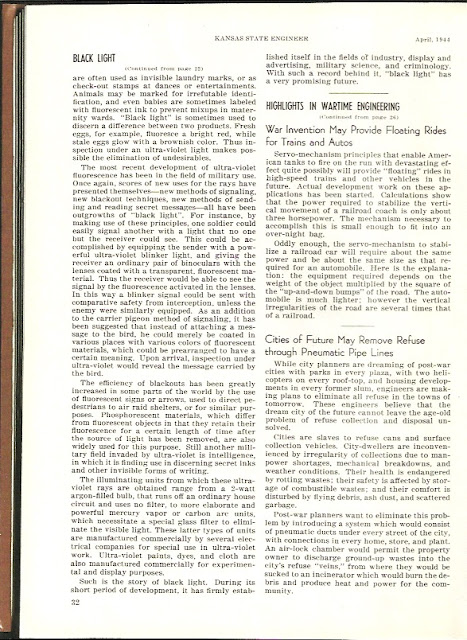Article by Opa for the Manhattan, Kansas Newspaper: The Mercury Chronicle
Transcription:
Allie Can Count On Underground Movements For Help
Editor's note: Thomas Doeppner, a student at Kansas State College, was for a short time with the United Press at Amsterdam. He is a German refugee, and his interpretation of developments in the European war theater carries the weight of his internment camp experiences in Nazi Germany, as well as that of previous years of travel on the continent. The Mercury Chronicle each week brings you his interpretation of the war in Europe.
By Thomas W. Doeppner
Without any sign of fatigue or slowdown, the Russian armies are carrying on their fall-winter-spring offensive. Now, it's the Crimea that's on the road back to its people. Whether or not the German retreat in this peninsula is again a "voluntary" one, the fact remains that the Russians seem to be able to strike, and strike effectively, wherever they choose to on their 2000 mile front.
The Red armies advancing into Poland certainly never doubted that they would have to fight it out by themselves. How surprised then was their commander when suddenly, out of the forests and marshes of Poland, there appeared several hundreds of Polish soldiers, carrying their red-white banner and offering their cooperation in the fight against Germany.
Still, the Polish government in-exile in London remained non-committal toward this event which, according to Russian sources, has repeated itself several times. The London Polish government still considers Russia an enemy just as much as Germany and, therefore, is not willing to engage in any cooperation, military or political. Apparently, however, the Polish underground thinks differently.
It was assumed so far that the Polish underground, which is being supplied and fed by its London government by means of parachute loads, would operate under its direct command. Whether this new apparent independence is to be compared to an uprising is not certain; certain is, however, that the Polish underground is more likely to execute the will of the Polish people then a government which no longer has direct contact with the people.
The immediate military help which the Polish underground will give to the Russians is probably negligible. According to Polish estimates the underground has an army of approximately 50,000 to 150,000 men. Poorly equipped and scattered all over Poland, they will not be very effective as a unit compared with the dynamic Russian army. There are, however, two ways in which this action of the Polish underground will help the Allies considerably.
In the first place, it proves that the Polish people are on the Allied side. Since the Poles are fairly representative of the occupied peoples of Europe, this means that Hitler's propaganda of Quisling cooperation will no longer be very effective. Also, in the second place, it gives the Allies a preview of what might be expected from the underground movements as well as in Germany proper in case of invasion.
Poland, geographically, is very close to Germany, and therefore, relatively easy to control. The German garrison is Poland was comparatively stronger than in most other occupied countries. Concentration camps for Poles were filled; executions were daily events. In spite of all that, the Poles were able to organize an underground of such size.
If the Poles were able to do so, it is very likely that other countries were too. In that case, the Allies can just about count on the aid of underground movements in countries like Holland, Belgium, France, Denmark, etc.: undergrounds which probably will not be counted upon to do much actual fighting, but which will be very helpful in locating enemy strongholds, indicating enemy positions, and doing as much grinding damage as a group which is familiar with the territory and people is able to.
The Resistance. Everyone loves to hear about the resistance, myself included. It's the tale of the underdog, a tale of hope that small groups of people can effect change. It's also been proven to be effective over the course of history. So even though resistance is not new, and the successes are not unfathomable, it is always a toss-up which one will succeed.
Opa begins his article with a quiet praise of the tireless Russians. He's right- they are ridiculously impressive when it comes to war. I may have mentioned the comedian Eddie Izzard's bit about the Russians, when he blitzes through history and highlights that Russia in the winter (and most seasons) is almost unbeatable. He said Napolean went in and said "it's a bit cold!" and ran out. He said Hitler ran in thinking "I've got a different idea... no it's the same idea- bad idea, bad idea!" and ran out. Russia has an unbelievably long border to protect, but with that border they have millions of soldiers (who died in greater numbers than any other country), and a crazy capacity to withstand the freezing temperatures (or at least the willingness to sacrifice soldiers to hold the freezing ground). When Opa says that Russia continues their "fall-winter-spring offensive," I think it's in awe of the length of time and weather conditions that Russia has continued to push back against the Germans.
The Russians are now beginning to cross into new territory- occupied Polish territory. Quick critique: Opa says that Poland is geographically very close to Germany. It seems odd to say it that way when before the war, Poland was literally surrounded by German territory. At the very least he could have said Poland bordered Germany to the east. I know he knew that. Just seemed a weird choice of words.
The Russians are getting into Poland and expecting to continue their long-haul offense on their own. Then the movie-scene image comes out: a band of hundreds come out of the woods, raggedy Polish rebels offering their help in the fight against the Nazis. The Russians are shocked and happy to see help: a sign that not everyone in Poland will be their enemy. Opa numbers the resistance in men, but he should know better. Women are fighting too- his sister is playing her part in France (not as militia- but important), as well as other family members across Europe.
The Polish government, operating in England while their territory is under German occupation, is noncommittal to this underground movement. The Russians are the political enemy as much as Germany. When I read Opa's words that the underground seemed to disagree, I thought to myself how things are so very different when you are in the midst of it. The government cannot fathom what the Polish have experienced at the hands of the Germans. Russia may not be their best friend, but the Germans are enemy #1 for those under occupation. The Polish underground might be assisted by the official government, but when push comes to shove- they're going to do what is necessary. I hope they are rewarded for these actions.
The fact that the existence (and cooperation) of the Polish underground somehow proves that the Polish are definitively on the side of the Allies seems to me... uninteresting. I kinda thought this was understood. Also, based on my research, every government was aware of underground movements, many even worked to provide supplies and funding. They might have been unable to assess the efficacy of such movements, and maybe that's where Opa is going with his second point. Either way, the general public may have been surprised, in awe and reassurance with the appearance of these rebels, but I am pretty sure that the governments knew a lot more about what was happening in the underground.
Occupied Europe was definitely not chock-full of Quislings. This term I had to look up- it is a name that is synonymous with traitor, or cooperation with the occupying enemy. The name is of a Norwegian guy who earned the right to have his name used in such a way. Click the link for a brief, Britannica version of the story. I also question that in a previous article Opa mentioned how Hitler's terrible treatment of the occupied countries was a tool of fear that he used to scare the German citizens about any possible loss in the event that the occupied territories would exact harsh revenge. If that is the case, then how could there also be a fear by the Allies that the occupied territories were completely cooperative? We know that there was some cooperation, but I think it's pretty silly propaganda to believe that there was any majority cooperation. Who would believe that lie? (I have been surprised before at what people will believe.)
Opa's makes a solid point that the Polish Underground is a symbol of unbelievable strength and ability under extremely harsh conditions. Poland has Berlin in their backyard, and we know now that Poland was the location of some of the most deadly camps and harshest treatment of occupied citizens. If they can hide a militia- anyone can. Hope abounds.
And you better believe a group adept at hiding under the Nazi gaze is going to have something to offer. Even to the tireless Russians. Viva la Resistance!






